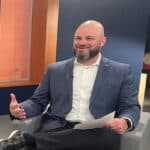Editor’s note: Lewis Walker is a columnist for Rethinking65. Read more of his columns here.

Reading Jerilyn Klein’s interview with George Kinder, “‘Father of Life Planning’ Urges Advisors to Pause,” motivated me to review my 40-plus-year journey as an active Certified Financial Planner. I graduated with the third class from the College for Financial Planning in 1975 and sold my practice in 2016. Along the way, I was fortunate to meet a variety of thought leaders who taught me the secret to financial-planning success.
That secret: Asking conversationally provoking questions and listening carefully to the answers. Your ability to defining and discover what is on the potential client’s mind, and whether they even decide to become clients, will be based on the impression you make and the questions you ask up front.
We owe much to George Kinder and other creative thinkers — Mitch Anthony, Dick Wagner, Carol Anderson, Susan Bradley, Dan Sullivan (the Strategic Coach) and Dan Taylor, among others — who taught legions of planners the art of “appreciative inquiry.”
Appreciative inquiry is based on a five stage, 5D model: define, discover, dream, design, deliver. It’s useful in strategizing a practical pathway for developing and delivering a comprehensive financial plan. Discussions about appreciative inquiry were very common at conferences in the 1970s and 1980s.
Before I share some questions that worked well for me, here are some of my suggestions for you, if you’re just starting out in this noble profession, or for your junior advisors:
Understand the Power of Association
Get involved in your local chapter of the Financial Planning Association, attend chapter meetings and volunteer for leadership positions. Also attend regional and national meetings, the annual FPA convention and the annual FPA retreat.
Recognize that you are involved in a vital profession — not an “industry” as some would claim. Learn from the best, those that have “been there, done that.” The educational sessions are valuable, but you will garner even more wisdom from conversations with your fellow practitioners between sessions and at cocktail parties and other gatherings.
Further Your Education
If you are not a Certified Financial Planner, or are not currently pursuing the designation, by all means go for it! The CFP credential is foundational.
The early graduates from the College for Financial Planning, at the time the only source of training and professional certification for a financial planner, were unique standouts in a world where most people in retail financial services were stockbrokers, insurance agents and bankers. The emphasis for them was not on long-term financial planning, but on selling products — stocks, bonds, insurance policies, bank loans, etc.
Learning “how to do financial planning right,” true consulting, was and remains an exercise in innovation and sharing. To bring value to clients, we must show clients how to develop solid financial underpinnings for the future they envision for themselves.
Be Mindful
Whenever a potential client arrived at my comfortably furnished conference room in my easily accessible office, my first questions after introductions were to find out what brought them in and what was on their mind. Asking the right questions, to get to the heart of the matter, is only part of the initial discovery conversation. Equally important is letting the client do most of the talking while you or an associate take copious notes — and being mindful.
Mindfulness means paying attention to what the person (or the couple) is saying about what is going on in their lives, what worries them, what challenges them, and what their goals and aspirations are, both short-term and long-term.
People seeking advice are challenged either negatively or positively by change. This can include a current or pending life transition of some magnitude (a new child or grandchild, perhaps), a health concern, an opportunity or roadblock, or any situation that has financial implications.
Three Provocative Questions
George Kinder of the Kinder Institute became famous in the financial planning community because he taught planners three provocative questions that stimulated deep and introspective conversations between client and planner. As I built my practice, I, too, found three open-ended questions to be useful in the initial stages of client engagement as well as in the ongoing relationship. Here are my questions, influenced by Kinder:
Question 1: 10-Year Challenges
In the first meeting with a potential client or client couple, I’d ask, “Looking out over the next ten years, and perhaps ten years beyond that, what challenges do you see, both positive and negative?
When clients start to discuss their challenges, you can learn a lot about their family members, marriage, career, health, retirement, education, death of a loved one, or any of life’s many quandaries.
This first meeting is also the time to ask about and try to identify any potential gaps in insurance planning and estate planning. Do they have sufficient coverage for death, disability and other health problems? What about property and casualty, including umbrella liability? Do they have wills, trusts and powers of attorney for health and financial matters in place? Business owners have additional challenges and unique planning needs.
Question 2: Middle-of-the-Night Call
Many advisors focus on planning for a happy retirement. Here is another question that opens up discussion, especially for an older person or couple anticipating retirement: What if a major health crisis pops up along the way? Or you may want to try phrasing it with a greater sense of urgency.
Let’s say you’re speaking with Joe and Sarah. You already asked about their family and know they have grown children and grandchildren. Look at Joe and then Sarah and say:
Sarah, its three o’clock in the morning. Joe either is having a heart attack or a stroke. In a panic you’re calling 911 to get him to the hospital. Once he’s at the hospital and being cared for, you are going to make a second phone call. You have three adult children. Who will you call next?
Some clients know; some don’t. Suppose Sarah says, “My daughter Susan will get the call.” That answer opens a whole new pathway for conversation for you with Sarah and Joe, or with their children.
For example, will Sarah be able to cope with Joe’s situation if he becomes physically impaired? How will his ongoing healthcare needs be managed? Who deals with complications related to health insurance and Medicare? If he needs assistance in activities of daily living, can Sarah cope? Will she need outside assistance and who pays?
Suppose the situation is reversed and Sarah, not Joe, is rushed to the hospital. If she needs ongoing care, how will Joe cope? Is the master bedroom on the first floor and will it be converted to a “hospital room” of sorts? Is the home suitable for someone in a wheelchair? Men, I’ve found, are often not natural caregivers. They want to figure out the nature of a challenge, fix it, and move on. But some things can’t be fixed.
Meanwhile, have they updated their powers of attorney for healthcare and financial matters? And are one or more of Sarah and Joe’s children listed as a backup if they need to step in to help their parents?
So many questions. So many complications, especially challenging during an emergency. These discussions often lead to a family meeting, especially involving the go-to child. Often the designated adult child is in their 40s or 50s, with a family and challenges of their own. They may or may not be working with a financial planner, so this is an opportunity to add a client family to your practice. Forming a “family care team” to deal with parental challenges is a powerful concept.
Question 3: The Endgame
Mitch Anthony has wisely noted that in retirement you need to know that you have enough money to allow you to sleep peacefully at night, but you also need a purpose to wake up to in the morning.
Have your clients accomplished their life’s goals and accomplished their bucket lists? What else is left to do? That’s where the endgame question comes in.
We’ll pose it to Fred and Mable, a long-married couple who have been your clients for many years. Fred owns a closely held business and plans to retire soon. At the end of the couple’s yearly review and good conversation, you add,
Mable and Fred, you’ve been clients for years. We truly appreciate our relationship with you, and I want you to consider something. You leave this office and on the way home you’re on the busy beltway highway, talking about some of the matters we discussed today. Suddenly there’s a violent jolt and a loud noise, then quiet. You both realize you’re floating high in the air in disembodied form, looking down at the smoking wreckage of your totally destroyed car as people run toward the accident.
You look at each other and exclaim, “I think we’re dead.” You look in the distance and see your house and you know that you can’t go home again. You see the homes of your adult children and grandchildren but you know you will never visit again. Fred, you see your office but you’ll never be going to work again.
But God with love and mercy allows you to come back to this conference room in perfect form and meet with those family members and people you love and care about the most. You have one hour. Sixty minutes. What will you tell them?
This is my “ghost story.” Clients have said that this was one of the most thought-provoking questions they have ever pondered. What’s left in your life to be done? One way to send final messages to those you love, if and when the unexpected happens, is through a family love letter.
How might you answer the three questions posed above? How might you answer George Kinder’s three questions?
Lewis J. Walker, CFP®, MBA, CEPA, graduated with the third class of the College of Financial Planning in 1975. He served as national president and chairman of the Institute of Certified Financial Planners (ICFP), a forerunner of the Financial Planning Association. The FPA honored Lewis as a pioneer in the profession by presenting him with the P. Kemp Fain, Jr. Award in 2011. Retired from active practice, Lewis continues to serve as vice chairman of the board of Atlanta-based SFA Holdings, Inc., parent of The Strategic Financial Alliance (SFA) and SFA Partners. These organizations provide a myriad of support services to independent financial advisors.







